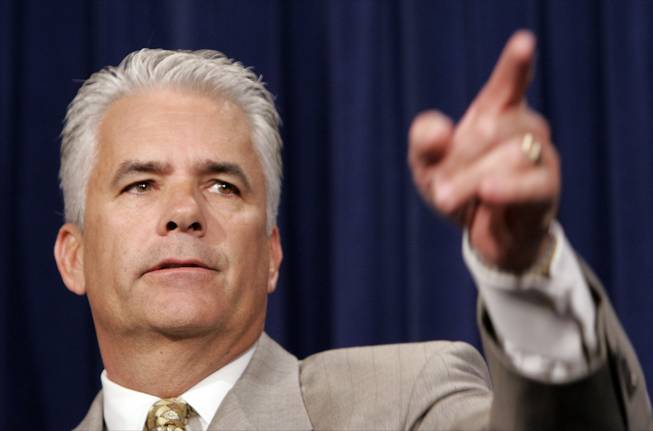Friday, Feb. 22, 2013 | 2 a.m.
Sun coverage
Washington is a place where party lines count. But in the next few months, lawmakers will frequently be asked to cross them as Congress takes on tough policy issues for which consensus won’t be possible without bipartisan support.
Nevada’s Republican representatives have already expressed some willingness to eschew old party positions in the spirit of finding a workable comprehensive immigration reform solution. Meanwhile, some Nevada Democrats are still wrestling with how they will vote on gun control laws President Barack Obama has called on Congress to consider in the wake of the Newtown massacre.
For better or for worse, breaking rank is an increasingly difficult business in Washington: Two decades ago, it was possible to find Republican lawmakers with more liberal voting records than their Democratic colleagues, and Democrats who had a more conservative record than Republicans. Now, voting patterns show that no lawmaker in Congress has a voting track record that crosses the invisible political center line.
Still, there are a lot of individual occasions when lawmakers dispense with formal dividing lines. Here is a list of a few memorable ones, featuring current and recent Nevada representatives.
-
Harry Reid and the "Screw Nevada" bill
In the 1980s, a Congress reeling from the Three Mile Island incident was grappling with how to step up the national approach to nuclear safety, including how to dispose of nuclear waste. By 1987, lawmakers settled on a solution in the form of the Nuclear Waste Policy Amendments Act, better known in the Silver State as the “Screw Nevada” bill. The legislation, which Congress passed just a few days before Christmas that year, designated Yucca Mountain as the country’s sole nuclear waste repository.
Newly elected Sen. Harry Reid wasn’t about to let that verdict stand without a fight. Reid was just a few months into his tenure as a senator when the act was introduced, and he spent the rest of his first year leading an impassioned charge against Democratic Sen. Bennett Johnston of Louisiana and other leaders of his own party — Democrats controlled the Senate and the House at the time — to kill the bill.
In the end, Reid’s efforts failed: Only five Democratic senators bucked the party line with him, in a final vote of 63 to 30. But he would set a trend for Nevada lawmakers for decades to come. It is now common practice for Nevada lawmakers to vote down legislation containing authorizations or money for development of the nuclear waste dump at Yucca Mountain, no matter what authority in their own party they have to flout to do so.
-
Joe Heck on Obama's housing reform
Heck saw a similarly unique set of circumstances for Nevada during his first few months in Congress, when the Republican-led House of Representatives took a series of votes to strip funding from the Obama administration’s mortgage refinancing programs, aimed at giving underwater homeowners a chance to get their finances afloat.
Republicans objected to continuing to spend money to fund a program that had been documented as sorely inefficient: Administration officials had predicted they could help 1.5 million homeowners with a program to refinance existing underwater mortgages through the Federal Housing Administration, but by March 2011, only 245 homeowners had even applied.
Heck was the only Republican who refused to pull the plug.
“A failed P.R. job should not be the reason a good program dies,” Heck said at the time.
Although the measure to defund the FHA refinancing program passed the House by a wide margin, it never became law.
The program is still struggling to leave a more noticeable mark on the housing sector. By the end of 2012, lenders had originated only about 2,000 refinanced mortgages through the FHA program.
-
Shelley Berkley and Obama's housing reform
In hardest-hit Nevada, housing passions ran high in 2011 — and Heck wasn’t the only one citing them as he told his party to take a hike. Although Berkley backed the idea of FHA-driven mortgage refinancing, she and a small group of Democrats railed against Obama’s flagship Making Home Affordable Program, or HAMP, arguing it was time to call it quits on a failed venture.
Obama’s main program to combat the housing crisis had instituted such strict qualification requirements that it had essentially boxed out Nevada applicants, leading to a 2.6 percent success rate in the state.
Urging the president to devote attention and resources to principal reduction programs instead, Berkley joined a handful of other Democrats who split from the party and voted to end federal support for the program, giving the president his first significant in-party blow for his handling of the federal response to the housing crisis.
Senate Democrats did not follow suit, and the program stayed on the books.
-

John Ensign and 'don't ask, don't tell'
In late 2010, Ensign — with his extramarital affair, ethics scandal and religious C Street house residency documented and exposed — was not the most likely candidate to sound a clarion call on social and moral values.
Perhaps that’s why Ensign was so quiet about breaking with his party to vote in favor of repealing the military’s "don’t ask, don’t tell" policy.
Ensign had been visibly torn about his choice in the hours before the vote, even voting against a procedural measure to bring up the bill for a vote so that he wouldn’t have to make a final decision between voting his conscience and voting to defer to military generals who had raised concerns. After the final vote, he slipped out of the Capitol so quickly that no reporter could catch him.
In the end, Ensign’s vote to go with his conscience over the objection of most in his party didn’t make or break the vote: then-Sen. Scott Brown, R-Mass., had already signed on as the all-important 60th vote to break any filibuster attempts weeks before. But he was the most conservative of the eight Republican senators to make the gesture and vote to end the policy.
-
Dean Heller and the Violence Against Women Act
The Senate’s easy passage of the Violence Against Women Act this month, coupled with the House’s promise to take it up in short order, might easily make one forget that this law was incredibly controversial not too long ago.
At this time last year, Republicans were locked in an ugly war about women’s issues. Politicians were going to the mat over an amendment to give religious organizations a reprieve under health care laws from covering birth control. Democrats were still seeing red over a recent Republican campaign to defund Planned Parenthood because of abortions. And a long-overdue reauthorization of the main federal vehicle to combat violence against women languished as lawmakers bickered about whether its protections should be extended to gays and immigrants illegally in the United States.
At the same time, Heller was locked in a visceral Senate campaign with then-Rep. Shelley Berkley, who had fashioned a gender-based argument against Heller with the intensity of a laser beam. He had voted in the House to defund Planned Parenthood and voted in the Senate against mandated contraceptive coverage. Berkley was all but daring him to take a third, “anti-woman” vote, as she called it, on the Violence Against Women Act.
Heller didn’t take the bait. In a public showing, he announced in late March that he would vote in favor of reauthorizing the act, despite his reservations, becoming the bill’s 60th guaranteed vote — the number necessary to avoid a filibuster.
Other Republicans would eventually follow Heller’s lead: Fifteen joined Democrats in April 2012 to pass the Violence Against Women Act by a vote of 68 to 31. The Senate recently repeated the vote with an even stronger majority of 78 to 22.






Join the Discussion:
Check this out for a full explanation of our conversion to the LiveFyre commenting system and instructions on how to sign up for an account.
Full comments policy